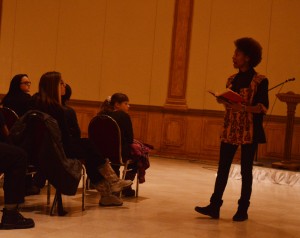Authors celebrate Black history at conference
By David Dyck
In the continuing observation of Black History Month, authors from Windsor, Fayetteville, Ga., New York and Easton, Pa. took part in an event to celebrate multiculturalism, diversity and Canada’s past.
Taking the slogan “Literacy makes the world go round,” the Pediatric Reading Early Accelerates Development organization held its ninth annual conference at the Ciociaro Club on Feb. 26, where Windsor author Linda Flay joined American authors Floyd Cooper and Noni Carter.
Kaysandra Curtis, 57, is the founder and current head of the R.E.A.D organization’s board of directors. She said the principle message she wants to get across is one that addresses multiculturalism, bullying, getting along and treating people with dignity.
“We want to read about other people’s cultures so we can understand them, so we can be friends with everybody,” said Curtis. “We don’t want to see people’s differences and stereotype them. We want to look at somebody and see them as a whole person.”
With Kindergarten to Grade 10 students attending from schools all across Windsor, Linda Flay endorsed her first book, entitled Abimbaboomba, about an imaginary monster that takes a boy into a dreamland. Cooper, an illustrator since 1988, played with groups from Grades 3 to 5 in The Scribble Game, in which children came up and took turns adding necessary pencil markings on top of previously made marks to draw a cartoon character. Showing additional drawings and sketches he has made over the years, he received a full auditorium of raised hands when he asked who would want one of the drawings.
Noni Carter, 23, spoke to Grades 6 to 10 students.

Noni Carter reads from her book “Good Fortune” to an audience consisting of grades 6 through 10. Carter’s book tells of a slave girl taken from her homeland Africa to be a slave in 19th century America.
PHOTO BY/ DAVID DYCK
Born in Georgia in 1991, Carter’s writing career began when her Kindergarten teacher gave her a journal and an encouragement to never stop writing. When she was 11, she heard her great aunt tell the story about her third-great grandmother seeing her mother sold and it motivated Carter. According to Carter, she wanted to “educate young people about history” and her personal history.
Carter’s book Good Fortune tells of a young woman snatched from Africa in the 19th Century to America to be a slave, but eventually escaping to freedom. The book deals with emancipation, the concept of true freedom and of the importance of education and universal literacy. Carter recently took this last ideal to Africa, traveling with the organization Children’s Literature for Children to bring books to those living in rural areas.
These themes coincide with public school curriculums finishing up their Black History reading list. Carolyn Dobrich, 42, a Grade 6 teacher at Lakeshore Discovery School, said Nani’s book is going to be the next “read aloud” in class. Dobrich said Noni was “engaging with her audience” and she believed they would all take something away for themselves. Eight or nine aspiring young writers even brought little notebooks to copy notes down.
All students who attended the event were enrolled in a short-story writing competition, due at the end of May. Winners will receive a trip to the Black History Museum, where events such as Juneteenth, the day slavery ended in America on June 19, 1865 are commemorated.
Cooper also commemorated Juneteenth in his most recently written book, Juneteenth for Mazie. Cooper said, “What Kwanzaa is to Christmas, Juneteenth is to July the fourth.” It is currently recognised by roughly half of the U.S. states. Treated as a “floating holiday” it is nonetheless an important date for African-Americans and African- Canadians to remember their past, a time when their views were silenced. Carter said she continues to return to in her writing.
“One of the things I fight for in my research… is the representation of voices that I think are silenced, in many cases in my country and around the world. It’s the minority that I turn back to,” said Carter.
Carter’s writing is not restricted either just to African Americans. Her upcoming projects include looking at the issues of abortion and domestic violence.


